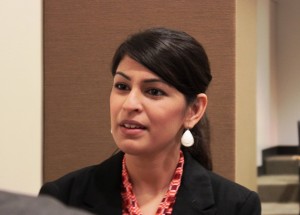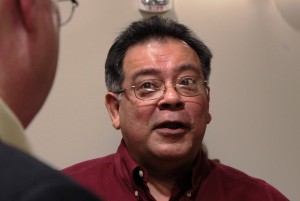Texas Neighborhoods Where Climate Change Could Hurt

Dave Fehling / StateImpact
Nadia Siddiqui is a policy analyst at the Texas Health Institute
Texas needs to do more as a state to prepare its most vulnerable communities for the impact of climate change according to health researchers.
“We may face the ‘perfect storm’ in the State of Texas where the most vulnerable, low income communities, high-diversity communities are very disproportionately impacted and affected,” said Nadia Siddiqui.
She’s a policy analyst at the Texas Health Institute. It compared Texas and neighboring states on how seriously they were preparing for the potential effects of climate change: sea level rise, more frequent and more intense storms, and changes in air quality.
“In reviewing some of the adaptation plans at the state level, we find that communities are not very well addressed. Particularly, communities of color and those most vulnerable to the impacts of climate. They’re too often missing,” said Siddiqui. Earlier this month at Texas Southern University, she took part in a roundtable discussion about what could be done to help communities cope.
The Skeptics of Texas

Photo courtesy of RRC
Barry Smitherman is the chairman of the Railroad Commission of Texas, now running for Attorney General.
In an analysis last year, the group ranked Texas next to last in being proactive on things like having top-level advisory groups and a climate change plan. Of nearby states, the report ranked Arizona most prepared, Louisiana least. A national report by the Natural Resources Defense Council had similar findings.
Texas leaders have been vocal in their skepticism that climate change is real.
“Don’t be fooled — not everyone believes in global warming” was a tweet from earlier this summer from state’s head of gas & oil regulation, Barry Smitherman.
For those who do believe climate change is a real threat, Texas is a tough sell.
“Just using the term climate and talking about climate change is very difficult in this state,” Siddiqui told StateImpact.
Neighborhoods Most Vulnerable to Climate Change

Dave Fehling / StateImpact
A truck wash near the Port of Houston
The report by the Texas Health Institute took demographic data on income and race and crunched it with geographic data showing where climate change could have the most impact. Correlations emerged showing that people of the least means might face the most impact.
“If a hurricane ever came straight up the Ship Channel, it would devastate our community,” said Cruz Hinojosa, a community activist in Galena Park.
It’s a small city right up against the Port of Houston, one of the busiest sea ports in the nation and home to the biggest concentration of refineries and chemical plants. Climate change not only might increase the odds of devastating storms, it might also increase their flooding potential because of rising sea-levels.

Dave Fehling
Cruz Hinojosa is a community activist in Galena Park, east of Houston
Hinojosa said it’s important for government to be proactive and work with places like Galena Park because so many residents are of modest incomes and have their hands full trying to make ends meet. Many he says are immigrants.
“They don’t speak English and they really don’t understand what that means. No entiendo que dice eso,” said Hinojosa, talking about the reaction he gets when talking with residents about climate change and sustainable communities.